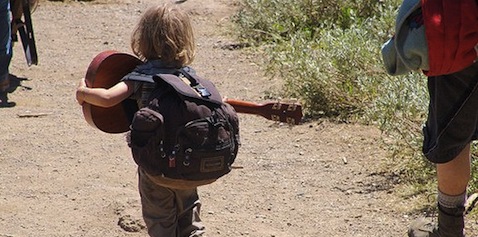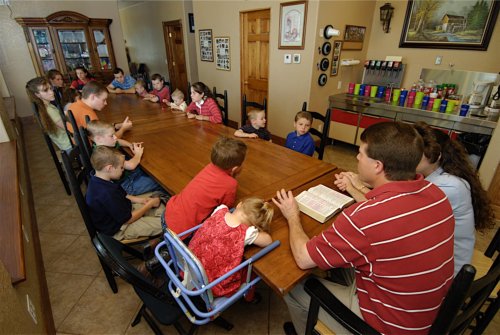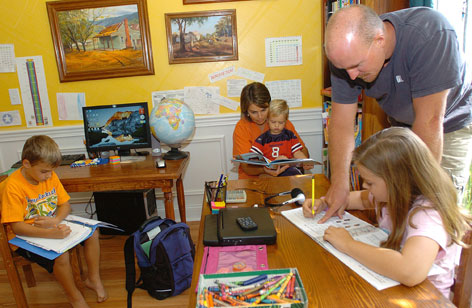
Unschooling is a movement that gathered steam from dissatisfaction with the public school system. It is not to be confused with homeschooling, which is another movement entirely. Homeschooling is popular with both very conservative Christians who want to shield their children from the demonic influence of secular humanism and some more liberal people who want to take a more active role in their children’s education. It’s also filled a gap for children who struggle socially and don’t have alternative schooling options that are available in some areas.
Unschoolers and homeschoolers are not the same. They’re often classed together but that’s a lot like classing hippies and Duggars together. It’s very entertaining to think about and they would probably benefit from some quality time together, but the philosophies remain different. Most homeschoolers use some combination of online curricula, structured workbooks, community education classes and one-on-one teaching.
Unschoolers feel children will learn better and more naturally through natural experiences like working, playing, gaming, interaction with experts and other more organic experiences. The parent “facilitates” these experiences as opposed to directing them. Unschoolers feel strict structure represses learning and destroys a child’s natural curiosity.
Here are some quotes by unschooling writers. I think they help to illustrate the mindset:
- “They (children) will not feel the freedom that is necessary for true happiness and achievement if social expectations such as college or financial independence loom.” Sarah Parent
- “What I have observed in all three of my children is that they do have difficulty fitting in real-world circles because everyone else has so much baggage to complain about nonstop.” Barb Lundgren (I love the “us versus the mindless herd” mentality).
- “We have been watching a series of “Swan Princess” movies, so one day my daughter sculpted all her Barbies’ clothes hangers into swans.” By Karen S. Gault. (I have to point out that my kids do stuff like this all the time but they’re still receiving some formal education).
- People will say “How will they learn algebra in the real world?” Is there algebra in the real world? If not, why should it be learned?” Sandra Dodd.
- “The big roadblock to unschooling question ‘But won’t he just play all day?’ My answer is always the same, a definite maybe. But not forever.” Mary Gold
- “Deschooling is not just the child recovering from school damage. It’s also the parents exploring their own school and childhood damage and proactively changing their thinking until the paradigm shift happens.” Robyn Coburn (Is there anything more fun for a child than taking a journey through Mom and Dad’s emotional scars?)
Unschooling, not surprisingly, was born in the seventies. A meandering hippie named John Holt came up with the theory that children are “natural learners” and learn best without restrictions and regiments. Unschoolers endorse the idea that a child’s natural curiosity and motivation should self-direct education. Children learn differently. This is not news to anyone who experienced public education and was mystified as another child unraveled a word puzzle. I myself sat clueless through geometry class while other students asked intelligent question and was mystified as a another child created a work of art out of a tattered red crayon and a dried bottle of glue. However, I could always read and assess things fairly quickly so I had my own moments of victory. Everyone learns differently. That’s an important lesson to learn in life.
It’s so enchanting to imagine that a trip to Six Flags will result in discussions about physics and engineering. Parents could fill their children’s lives with enriching trips to art museums, libraries, farms and museums. Science class could happen in the garden and math could be taught through cooking and building. I’m not entirely sure how parents are realistically going to earn a living and engage in this type of inspired facilitation but it’s nice to imagine.
I am not here to claim that U.S. or any other school system could not be wildly improved. I am concerned that the children involved will develop a raging case of “special snowflake” syndrome. Children with this syndrome don’t always understand that the world wasn’t created to fulfill their individual whims. The mundane rules and routines of life, unfortunately, apply to all of us. Life is not always enriching and entertaining. Early education teachers are great at helping children understand that they have to wait their turn and circumstances are not consistently pleasant. This knowledge is a good foundation for all corporate jobs. Life is easier when you’re not surprised every time things don’t go your way.
The other popular claim of unschoolers is that it’s more important to “know how to learn” than to learn any particular topic. This statement is rife with truth and deceit. Research and investigative skills are invaluable as are curiosity. But, some common base of knowledge is a good thing. You will sound like an insufferable moron if you try to discuss politics without any knowledge of history. Likewise, it’s difficult to have meaningful conversations with people who haven’t been exposed to Shakespeare, Atticus Finch and The Catcher in the Rye.
Then there is the issue of requiring people to learn some things they don’t necessarily want to learn. So, you force them to take math and they hate it and get bad grades. This was my personal experience. I do, however, understand the value of math and I have some rudimentary understanding of mathematical concepts. I would never have been able to hold down a job without several years of math education. The work world is riddled with spreadsheets no matter how much you try to avoid them.
When it comes to general topics, should children be forced to learn things they aren’t interested in? What if they never have the impish curiosity that leads them to tackle math, literature or some other subject they dislike? Down the road, they’ll blame you because they are ignorant and unskilled and have missed opportunities. Or, they’ll feel that they are perfectly educated and skilled and plod forward ignorantly and do untold amounts of damage.
If you give children a choice about everything, you are going to get some less than ideal results. I could shop at organic farmers’ markets until the cows come home and my son would still be pushing an all-frosting diet. He is not qualified to make all of the decisions that will affect his life significantly. I feel confident that his teacher’s insistence on correct spelling will pay off in the long run. He’s also learning how to work with other people and he’s learned a lot about how other people’s thoughts and feelings affect their behavior. This kind of knowledge is invaluable as the years go by. That, combined with a common base of knowledge, is one of the goals of group education.
Again, I’d like to re-emphasize that I am not saying our school system is perfect. Bullying is a huge problem. I think there is far too much one-size-fits-all education and motivation and learning theory could be much more effectively integrated into the system. Art, music and physical education need funding. Children with learning disabilities need far more support. Don’t even get me started on “No Child Left Behind.” However, that is another conversation entirely.
I’d like to leave you with some super-fun unschooling sites for further reading:
- I’ve really enjoyed Sarah Parent’s writing because it is not in any way self-righteous. Her family has gone from mere unschooling and undisciplining to living in an RV for a life of “travel and continued connection.” Her blog is http://www.clanofparents.com/ and she’s got a fun website that’s accepting donations as well, http://werhumansbeing.com/.
- Jan Hunt is another parent of a natural child as opposed to the synthetic ones at my house: http://www.naturalchild.org/jan_hunt/.
- Another fun site is http://www.sandradodd.com.
(Photos: Loupiote, The Duggar Family, Vickie D. King for The Clarion Ledger, Shona Watts, Corwin Press)



